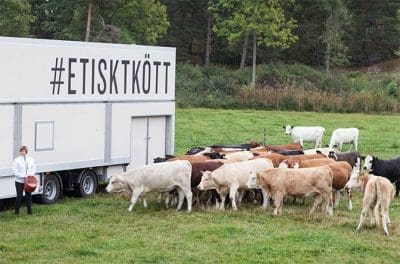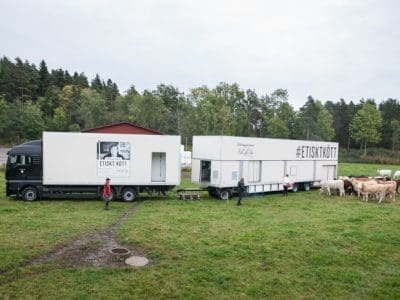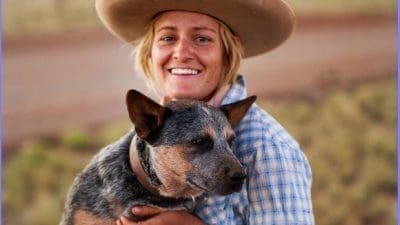WHEN a mobile abattoir concept won first place in an Australian ag tech startup competition last year, predictions of pending disruptions to the traditional red meat processing chain quickly followed.
However, while debate continues around the pros, cons and likely viability of mobile abattoirs in Australia (more below), there was a bigger and more immediate barrier standing in the way of the award-winning start up from actually starting up.
That was the fact that it is illegal for such a facility to operate in Victoria, where the company is based.
States govern abattoir licensing
State Government legislation dictates how and where abattoirs can operate in Australia.
All states allow mobile butchers to process animals on farms, provided the meat produced does not actually leave the farm.
However, legislation between states varies (as detailed later in article) in terms of allowing meat processed from a mobile facility to be taken from the farm on which the meat was processed or sold.
Victorian legislation does not currently allow mobile abattoirs to operate as an alternative to fixed-site processing plants.
However, since the SproutX startup event in Melbourne last July, work has been underway within the Victorian Government to fast-track legislation that would expand the definition of an abattoir from being a place to being a mobile facility also.
Legislation set for Vic Senate this week
Amendments to the Victorian Meat Act that would allow this to happen are due to go before the Victorian Senate this week.
The amendments are contained within what is called ‘omnibus legislation’ – a bill that packages together several other measures in a single vote – so could yet be ‘bumped’ to a later date, as has happened twice already.
But even if the Victorian Upper House does approve changes to the Meat Act this week, it is likely to be some time – perhaps as much as a year – before the underpinning regulations needed to enable a mobile version of an abattoir to actually operate in Victoria are worked out and put in place.
Multiple layers of regulations covering food safety, water quality, environmental planning, waste disposal, workplace health and safety, zoning issues, NLIS traceability etc, and requiring decisions from a range of different regulators and Government bodies, must yet be developed before the concept can proceed in Victoria.
However, with this week’s scheduled vote the ball is certainly starting to roll at least.
Commercial viability?
Some are confident mobile abattoirs can and will provide a genuine way to lower costs, increase efficiency and improve animal welfare in Australia’s red meat supply chain, by transporting the processing plant to the animals, instead of the other way around.
In Australia where cattle must often be transported long distances for processing, removing or reducing that cost would certainly be an attractive proposition for many producers.
FarmGate MSU, the start-up that won last year’s SproutX event, says on its website that mobile processing will introduce a new category of red meat to the Australian market: ‘ethical meat’; because it will remove the stress of live-animal transport from the processing process. This would allow brands using mobile processing to claim the “highest animal welfare and eating quality standards”, with attendant value-adding/branding opportunities.
 Swedish company Hälsingestintan has launched Europe’s first mobile abattoir (pictured at top of page and right), which it describes as “a rolling, stress-free abattoir that actually goes to the farm, eliminating unnecessary transportation for the animal.”
Swedish company Hälsingestintan has launched Europe’s first mobile abattoir (pictured at top of page and right), which it describes as “a rolling, stress-free abattoir that actually goes to the farm, eliminating unnecessary transportation for the animal.”
It includes two trailers pulled by a prime mover, and is designed to operate anywhere by providing its own electricity, water and cold storage for processed meat.
It can reportedly slaughter up to 30 animals a day, using a staff of four people. A Scottish Farmer newspaper report said the meat is then transported to the company’s hanging hall for tenderising and cutting.
The company also says a veterinarian is always on hand to ensure high levels of animal welfare.
But others say their research of practical experiences with small and mobile abattoirs in other countries has highlighted complexities that will make the concept difficult to work in practice.
In one report published in October 2017, small-scale South Australian farmer Tammi Jonas said she visited a mobile slaughter unit owner in Kansas, but found the unit was in reality parked permanently in a shed.
She said she learned its viability had been impacted by a range of factors including difficulty in securing continuous throughput, the costs associated with moving from farm to farm (ie staff accommodation), and issues with compliance and zoning when working across multiple sites.
“Further research has led me to believe that mobile abattoirs might work in remote areas, where the farmers could bear a higher slaughter fee in recompense for the recovered opportunity and motor vehicle costs of long transport distances, but that in a region populated with small-scale livestock farmers such as the central highlands of Victoria, a fixed abattoir is more likely to be both viable and sustainable in the long term,” Ms Jonas wrote.
In 2009 well-known northern WA cattle producer Annabelle Coppin investigated Mobile Slaughter Units as part of an overseas study tour.
She wrote in her resulting report that the Australian industry should recognise their potential benefits here, particularly for remote regions far from processing facilities. MSUs offered flexibility, lower capital investment requirement and niche marketing avenues.
However, the greatest challenges she found was the low throughput – the mobile and modular slaughter units she visited in the US could only handle between 10-50 cattle per day – which put pressure on economic viability, and the cost of regulation, which she found was a major inhibiting factor in the US.
“It’s very encouraging seeing this move forward, legislation was our main hurdle and if we get this over the line, they could become another option to seriously consider,” she told Beef Central this week.
“US regulation seemed far less of an issue compared to Australia, we have far greater regulations and costs associated with this.
She said the throughput challenge was a genuine issue and therefore she did not feel that MSU’s will ever solve large supply chain challenges of beef processing in the north.
“However, I do feel they will benefit producers who are chasing high-value vertically integrated markets for a small section of our individual market share, which I believe, we so badly need here in our industry for market diversity.
“MSU’s have to hit that market where the story is told (so they are not for everyone), that extra value will hopefully offset the inefficiencies of processing compared to conventional abattoirs. I still hope to have one here on Yarrie one day!”
Meat processors’ view:
What do established ‘bricks and mortar’ meat processors think about the trend?
Robert Barker from the Australian Meat Industry Council said the industry view is that where legislation and regulations allow for the operation of mobile abattoirs, AMIC would expect that mobile abattoirs must comply with regulations at least as strict as those for fixed location abattoirs, particularly given concerns around waste management, potential biosecurity risks, food safety assurance, traceability and compliance with NLIS, environmental regulatory requirements, local council planning, and licensing conditions.
“For mobile facilities acting as meat retail outlets, they should be subject to the same number of audits, requirements for food safety plans, and licensing conditions, as any fixed retail outlet,” he said.
Mobile abattoirs in other States:
While Victoria is close to passing legislation, some other states do already allow mobile abattoirs under existing legislation, according to Beef Central’s inquiries.
Queensland: A spokesperson for Safe Food Production Queensland said mobile abattoirs would be assessed for accreditation primarily under the requirements of the Australian Standard for the Hygienic Production and Transportation of Meat (AS4696) and the Australia New Zealand Food Standards Code.
There were currently no mobile abattoirs accredited for operation in Queensland, the spokesperson said.
Western Australia: It seems possible that a mobile abattoir could currently be approved in Western Australia, provided the design can comply with the existing standards. Some have been considered in the past but had not proceeded past the conceptual stage, a spokesperson of the Western Australian Department of Health told Beef Central.
The spokesperson said in that State abattoirs need to comply with the Food Act 2008, Food Regulations 2009 and Australian Standard for the Hygienic Production and Transportation of Meat and Meat Products for Human Consumption(Standard).
“There is no reference to mobile abattoirs in the Standard. However, from the Department’s perspective, there is no reason why mobile abattoirs cannot be approved provided they comply with the Standard.
“These could be fully self-contained units or have some fixed facilities at certain locations with a mobile unit moving between locations.
“Currently, there are no mobile abattoirs operating in WA and the Department is not aware of one that has operated in WA.
“The Department of Health has considered a number of mobile abattoir projects over a long period of time and none have proceeded past the concept drawing stage.
“With respect to compliance and enforcement issues, local government is the enforcement agency for most domestic abattoirs. However, the Department of Health (DOH) is the enforcement agency for State Regulated Export Registered – Tier 1 – abattoirs, and the DOH CEO is the Controlling Authority with respect to the Standard.
New South Wales: Robert Barker from the Australian Meat Industry Council told Beef Central he has been advised by the NSW DPI Food Authority that there is nothing in NSW legislation of regulations prohibiting the operation of mobile abattoirs.
“In fact I believe there have been mobile operators in the past, although they have tended to shut down after a short period of time due to the high costs in complying with regulations relative to the low throughput of livestock.”
Tasmania: A Tasmanian Department of Primary Industries, Parks, Water and Environment spokesperson said mobile abattoirs cannot be used for commercial meat processing within Tasmania.
Mobile abattoirs can operate in Tasmania to provide a service for homekill processing, which is defined in ourPrimary Produce Safety (Meat and Poultry) Regulations 2014, whereby meat is produced from an animal slaughtered on behalf of the owner of the animal on premises where the owner resides and for consumption on those premises.
Accreditation under the Primary Produce Safety legislation is not required in respect to such activity.
Northern Territory: A Government spokesperson told Beef Central there is nothing in NT legislation that would currently allow a mobile abattoir to operate in the Territory.
Beef Central has also made inquiries to the food regulatory authorites in South Australia but has yet to receive a detailed response, and will update this article when those details are provided.



I’m contacting on behalf of Yellow Palm Limited Livestock who are looking at an Abbator Operations in Papua New Guinea. And we interested in this mobile units. Please send me an email. Thankyou.
Would you please advise if there is any additional information, or change to the Northern Territory’s legislation status or policy on allowing mobile abattoirs to operate in the N.T (from the perspective of a cattle station/ live cattle export business context and business diversification).
Hi just wanting to know if any mobile abattoirs have started in qld
Dear sir
We have from Mongolia city Ulaanbaatar!
My interest ist: camel cow cattle sheep mobile slaughterhouse for small capacity slaughtering /Truck/
Attention: Please send quotations price lists and brochures for this exact set.
Thank you very much for your cooperation.
Best regards,
Damdinsuren Ulemj
GOLDEN BUSINESS GROUP
Add: Bayanzurkh district 15th khoroolol Building 37-27 city Ulaan baatar, Mongolia
E-mail: gbg.888999@gmail.com golden99buisness@ gmail.com
Mobile/WhatsApp/Wechat: 00976 95956077
Hi all,
I agree with Robert Barker’s comments but also believe in the converse, that fixed meat processing works must also meet the same regulations required for mobile units. Product hygiene and quality are important for all consumers. Animal welfare and traceability are important for the entire industry to survive and flourish.
Stay safe and have fun, Simon
I strongly agree with this concept of mobile abattoirs to service the needs of those farmers who would benefit from utilising it. Overall, farmers costs continue to rise by the day, often leaving these families in great need as we the general population enjoy the fruits of their labour. Whatever can be done to help our farmers should not be ignored, and this opportunity to save on travelling costs etc, will hopefully also encourage the next generation to continue in an industry that is the often ignored.
Mobile abattoirs provide producers and consumers a choice in an industry that is generally consolidating and thereby limiting the types of farming and livestock operations that are viable over time. Diversity is important from a ecological, economic and biosecurity perspective.
I’m looking at doing camel . Is there anything in that line
My company Australian Free Range Meat Emporium based in NSW is an Australian owned company that specialises in the processing and distribution of game meat products for both export and domestic market. We are in the process of building our state of the art mobile processing plant located in the southern highlands of NSW. The facility will move around to the rural areas that sustain the harvest of the controlled game meat market.
Call me if your interested in any supply of our products which include: goat kangaroo venison rabbit haire and hopefully camel and donkey.
My number is : 0412733251
Thank you for your time
Regards
Debora Gallina
I am not sure why NLIS traceability would be required if the animal has not moved off the PIC.
In fact animals born on the PIC would not even need NLIS tags. But look at the raft of other red tape stopping such things. When you look at what was allowed for wild pigs and kangaroo harvesting. Shoot and gut them in the paddock, dirt and grass just added to the “flavour” then off to the local chiller for export to Germany or who knows where.
You raise a good point about the NLIS traceability, Paul. Editor
Tony makes a good point regarding ethically / unethically..
I think it is exactly the same as woolies and coles selling ‘rspca approved’ chicken. By them constantly pushing their ‘paid for’ rspca ‘accreditation’ down everyone’s throats, they are in fact insinuating that everyone else selling chicken that doesn’t carry this paid for, made up accreditation, is selling unapproved chicken. Which clearly isn’t the case.
I operated mobile buffalo abattoirs in the Northern Territory’s remote Arnhem Land in the late 1970’s processing field shot buffalo for both the Australian domestic small goods market and into Hong Kong under a Form 4 Slaughter License.
Regulations imposed after the US pet meat scandal where field shot donkey pet meat was entering the US fast food chain basically required no animal could be processed unless had a veterinarian on site on for an ante-mortem inspection, made the operation uneconomical and I transitioned into pet meat.
The assumption that transporting cattle (or buffalos ) long distances, sometime two days, to what ever interstate market has the best sale yard prices is less stressful than processing on site in a mobile facility also needs challenging.
Having disputes with the Land Council and pressure from the Mudginberri Export abattoir for access to these animals, I moved to the adjoining Mainoru a station and observed helicopter mustered buffalo from Bulman trucked 1000 km to Mudginberri, experiencing major losses during transport and on the slaughter floor.
After one muster the project was discontinued, the end result was a helicopter shoot out two years later as part of the TB and Brucellosis program. There is little doubt in my mind that at that time, pressure from US Regulator to control the then lucrative US manufacturing beef export market was reinforced by the Australian Government leading to present stringent abattoir licensing and slaughter requirements far in excess of other countries who put beef into the same export markets as Australia does, to our then, present and continuing economic disadvantage.
Mobile abattoir do have place and the “knockers” need to realize in some situations such as managing feral camels in Central Australia or other environmental situations such as wild cattle on indigenous land in the WA West Kimberley’s, this offers the best option
Living in Alice Springs and a former Chair of the Australian Camel Industry Association, a 2016 report by “Agricknowledge” does see a place for mobile abattoirs and I am surprised the Northern Territory does not have position on them, having been involved in a number of camel industry forums.
Thanks for your contribution to this discussion, Alan – delivered from first-hand experience and historical perspective. Editor
Just one of the countless challenges involved in mobile abattoirs is referenced in your story – a qualified veterinarian standing around watching no more than 30 head per day being processed. Horrifically inefficient.
It is also unbelievably presumptuous for the Australian Farmgate MSU project to suggest that “Mobile processing will introduce a new category of red meat to the Australian market: ‘ethical meat’; because it will remove the stress of live-animal transport from the processing process.”
Animal welfare is a whole-of-life process. To simply suggest that removing the transport-to-slaughter component makes it ‘ethical’ is ridiculous. Countless physiological and meat quality studies have shown that cattle travel remarkably well to slaughter facilities, with little or no negative impact on meat quality. By inference, Farmgate MSU is suggesting that the rest of the beef industry which transports cattle to market is acting unethically. Somebody needs to give these dreamers a good shake.
About as beneficial as an ashtray on a motorbike – only a lot more dangerous.